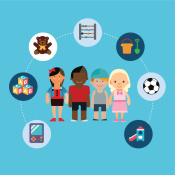Critical Information
The number of children ages 3 to 17 struggling with anxiety or depression rose by 1.5 million between 2016 and 2020. Educators trained in resilience will fortify their students and raise their potential for learning.
Two modes for promoting student resilience
Synchronous solutions…
include facilitated small group discussion, coaching, workshops, and more. Our unique web events include live group therapy, humor workshops to infuse fun into the classroom and even live events with comedians. Enjoy the video example.
Asynchronous solutions…
include on-demand video engagements on a range of topics from autism to dealing with difficult students. Faculty (and parents) can learn the rubric for developing greater resilience, will pass along this learning to students. Please enjoy this video montage on student engagement from our on-demand video library.
On-demand virtual engagements

BOO!
Boo another with a Ghost and candy

Thankful Thursday
Thankful Thursday!

360 Degrees of Integrity
Leaders who embody integrity have a remarkable strategic advantage. This video introduces a comprehensive method to influence through empowerment rather than disempowerment. Learn to be nimble.

Anxiety in Children Part I
A live workshop filmed in a NJ district, exploring anxiety in children. Differentiate from attention problems, learning difficulties, social problems, and academic issues.

Anxiety in Children Part II
Explore the reasons why children get anxious and how to differentiate from worry, fear, and panic. Also distinguish anxiety from ADHD, Learning Disabilities, and boredom (gifted).

Anxiety in Children Part III
Learn why anxiety is on the rise and how educators on the front line are seeing more challenges to their work in the classroom. Live workshop questions and answers.

Anxiety in Children Part IV
A more in depth look at the environmental and physiological causes of anxiety. Watch educators in the workshop explore their own beliefs and attitudes about this issue.

Anxiety in Children Part V
Mindfulness is taught as a strategy to help children learn to self-soothe. The final segment in this live workshop will bring together theory and practice.
Success Stories

"Whole School Health Through Psychosocial Emotional Learning highlights the importance of relationships, communication, and compassion for others. It presents a critical view in supporting, training, and retaining teachers through the lens of engaging and modeling behaviors that will help our rural students be better civic leaders and community members. My favorite quote from the book gives credit to the author's upbringing and modeling from his parents: 'We must experience the world through others so we can fully engage in educating all children. My father and mother modeled to me and my siblings how to experience the world through somebody else’s eyes, especially if their outer differences stirred up discomfort or displeasure, enriching all lives involved.' I recommend all leaders, teachers, and stakeholders secure their copy as they prepare for school."
Allen Pratt, Executive Director, National Rural Education Association (NREA)